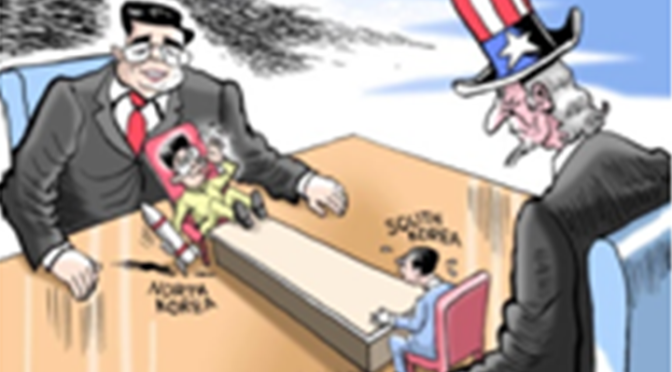The way forward for the Korean crisis
Posted on : January 1, 2018Author : AGA Admin

The Korean crisis has been a long-standing issue and one of the conflict areas of the Cold War era. After World War II, the Korean Peninsula, which was a part of Japan, got divided at the 38th parallel. However, more than 65 years after the Korean War fought during the Cold War, hostility and conflict is a recurring issue in the Korean peninsula. Also the constant muscle-flexing of military forces of the two states helps maintain the status quo. Moreover, the situation of conflict has risen in the last few months with the “Ulchi Freedom Guardian” joint military exercise and the nuclear warhead tests conducted by the Democratic People’s Republic of North Korea (DPRK).
Considering the plight of famine-stricken and an economically suffering DPRK due to constant war-like situations, diplomacy, should take a backseat. As Einstein says, “the world is a dangerous place to live; not because of the people who are evil, but because of the people who do not do anything about it.” The Korean crisis has been fought to satiate the pride of the superpowers while the supranational organizations have just stood as bystanders using diplomacy to no avail. Not always does diplomacy of the economically capable and developed countries efficiently work to resolve the issue. In fact, the nations in question should employ suitable foreign policies to lessen conflicts and enter into talks and conferences with each other, including neighboring countries to ensure regional cooperation and also take steps towards economic ties for cordial relations between them.
The United States has always played the role of a hegemonic mentor for South Korea. In the present times too, United States has not stopped helping South Korea as can be proved by the ten days “Ulchi Freedom Guardian” joint military exercise between the US and South-Korean Land, Sea, and Air forces. Unlike the US after the breakdown of Soviet Union, Russia did not take the place of a hegemonic mentor for North Korea. There have been numerous times when Russia has economically helped North Korea. Russia helped alleviate their debts and delivered humanitarian aid to the famine-stricken State twice in 1997 with food and medicine. The country still helps DPRK so that it does not become a satellite state of the US. However, Russia supported the United Nations Security Council on the nuclear issue going against North Korea.
China also got involved during the1950-53 Korean War when the world least expected it to. The country has always acted as a mediator and has an influence on DPRK like no other State. However, the recent nuclear tests and missile programs by North Korea has made China wary about its relationship with the country.
The UN supported South Korea during the Korean War. It has minimalistic interference in the humanitarian issues of the State of DPRK. However, the UN Security Council has been perturbed by the fact that DPRK has disregarded the Non-proliferation treaty and has continued the nuclear tests even after severe condemnation and toughening of sanctions for the previous ones.
During the Korean War, India was an active member of the Non-alignment movement and acted as a mediator to pacify both the sides, as it sensed a third world war around the corner rising from this issue. India’s foreign policy is neither indifferent nor inclined towards North and South Korea. However, India like the other countries is apprehensive of DPRK’s possession of nuclear weapons. India’s fears arise from the fact that Pakistan benefits from the advanced technology and uses derivatives of these missiles to advance their nuclear weapons.
However, amidst all this a mind-boggling question that stands, as Mr. Putin said, whether an impoverished North Korea is prepared to “eat grass” to build the bomb only because of a ruler’s megalomania? Moreover, how far will this crisis escalate before sensibility comes to us and we step in? When will the US, China, and Russia stop using the crisis for their vested interests and the UN and India help restore normalcy, quitting diplomacy?
Shaivi Sen
Intern
AGA
1.1.2018





Leave a Reply